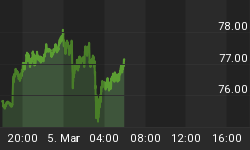In the clearest indication yet of just how severe the recent spike in Italian yields has been on the country's financial institutions, Italy's largest bank, UniCredit, surprised the market today when it sold $3 billion in dollar denominated five-year bonds. To find a willing buyer, the bank had to pay the equivalent of 420 basis points over the euro swap rate, which is six times more than the 70 bps over swaps it paid on five-year euro senior non-preferred bonds just this past January.
The spread on the new issue was a shock as it represented a nearly 150bps concession to current market rates, and is an indication of just how much even the strongest Italian banks have to pay up if they hope to access capital markets during the ongoing Italian political turmoil.

(Click to enlarge)
According to the bank, the sale will help support the Italian bank’s capital position and boost its subordination ratio by about 73 basis points.
And when we say the market was surprised, it wasn't just by how much UniCredit had to pay, but how many buyers turned up for the sale: just one, namely the world's largest fixed income manager, Pimco, which was the sole buyer of the bonds.
UniCredit’s decision to raise funding privately with just one investor suggests that analysts are skeptical about the wider market’s appetite for Italian bank bonds, said Jakub Lichwa, a credit strategist at Royal Bank of Canada in London: "The signal would have been far stronger if they had come to market with and built an order book at this level,” he said. Related: How Central Banks Impact Gold Markets
Which is ironic considering that even with a 150bps concession to market, the bank was still unsure it would find willing buyers.
Ironically, UniCredit said that the transaction “demonstrates UniCredit’s ability to access the market in all conditions,” which, of course, is precisely the opposite of what happened as the bank was forced to not only massively overpay, but also to approach just one buyer amid fears it would be rebuked by a broader syndicate.
UniCredit's surging funding costs are indicative of the problem faced by most of its peers as the rift between Rome and Brussels over the country’s budget has driven up debt yields and widened the spread between Italian bonds and benchmark German equivalents. Banks are also set to lose low-cost funding as long-term loans from the European Central Bank come due, while overnight ECB sources indicated that no new TLTRO will be forthcoming, perhaps as a bargaining chip to make sure Rome concedes to Brussels in the ongoing deficit debate which threatens to blow out yields far higher.
Commenting on the surprise "drive by" bond sale, ABN Amro NV strategist Tom Kinmonth wrotes that the possibility that Italy’s sovereign debt may be downgraded further may justify doing the bond sale now. While the price, far above the market rate, will impact the UniCredit’s profitability “it has placed the bank in a better position on capital for a prolonged period of time."
Related: Online Shopping Just Got More Expensive
As for why Pimco was UniCredit's sole buyer, Bloomberg notes that the Newport Beach-based firm was one of two buyers that took control of an unprecedented $20 billion package of non-performing loans sold by the bank earlier this year. Also, at the end of 2016, Pimco was among a handful of investors that were offered the bank’s riskiest bonds, people with knowledge of the matter said at the time.
And while UniCredit was successful in its directly negotiated, and massively overpriced, sale to Pimco, others have not been so lucky, with Italian banks issuing only €60.5 billion ($68 billion) of bonds so far this year, the least since 2013.
Which is why should the Italian political standoff with the EU not reach a favorable resolution soon, Italian banks - and their rising funding needs - will be first in line, especially once "lo spread" crosses 400bps, which the Italian government had made clear previously, is the "red line" before all hell breaks loose.
By Zerohedge
More Top Reads From Safehaven.com:
















